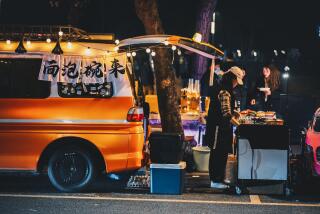Chinese Farmers Get the Goods Straight From the Horse’s Mouth
- Share via
BEIJING — A dusty field northeast of Beijing is transformed a dozen times a month into the capital’s premier horse market, with wily traders dealing in big money for the animals that are essential to the Chinese farm community.
Buyers and sellers come from as far as 60 miles away to the roadside market held on the 3rd, 5th, 8th and 10th day of the 10-day lunar calendar cycle. Most arrive on straw-laden wagons pulled by the horses to be sold.
On an average day, about 20 horses are traded for prices ranging from about $50 to $350, a hefty sum in China, where the annual per-capita income among the 800 million residents of rural areas is about $108.
“Some want to trade in their old horses for younger animals,” Wan Fa, a market administrator, said. “Others sell for money to buy tractors and even cars.”
Some horses, broken down by years of pulling plows and hauling rickety carts overloaded with produce and goods made in local factories, are heading for the local butcher.
Most of the traders, their hands buried into oversized greatcoats, their heads covered with ear-muffed hats, are pros looking to make a good deal.
Yang Zhengchun, the local tax man who gets a 5% cut of every deal, said that some traders will buy six horses for about $270 apiece and take them to a distant village, selling them for about $320 each.
“People are getting rich by trading in horses,” Yang said. Some have joined the ranks of $2,700-a-year households, the Chinese version of a millionaire, Yang said.
One young man said he wanted $540 for his 8-year-old steed, a sturdy beast but with unsightly bald patches on its skin, which are common to many of the horses here.
Wan said he might get $240.
Horses and mules being considered for sale are marched up and down the field to show that they aren’t lame. The traders then gather in little knots to discuss price. Wan said the five or six overseers offer advice but don’t interfere with price setting.
They also mediate occasional disputes when one party brings a horse back, claiming that he was cheated in the deal.
This market has been in business since the late 1970s, when the government began allowing more private enterprise and other reforms, which have significantly improved living standards in the countryside.
Many of the traders, though, have been dealing in horses for decades. “We learned about horses when we were still wrapped in our baby blankets,” said Wan, 62.
He said that by looking at the teeth and other parts of the horse, “we can tell how old they are, what kind of grass they eat and even what province they come from.”
About a third of rural households around Beijing own horses, northern China’s most important beast of burden and means of transport.
Horses are banned from main Beijing thoroughfares during the day. But they are a common sight in the suburbs, hauling precarious loads of cabbage and other produce to market.
Horses are in great demand in most rural areas because of the boom in private transport operations.
But Wan said that the horse is gradually losing out to motorized vehicles in the Beijing area as farmers become more affluent. Prices on the horse market have fallen 50% in the last three years. And horse trading, he said, may be in for a rough future.
More to Read
Sign up for Essential California
The most important California stories and recommendations in your inbox every morning.
You may occasionally receive promotional content from the Los Angeles Times.








